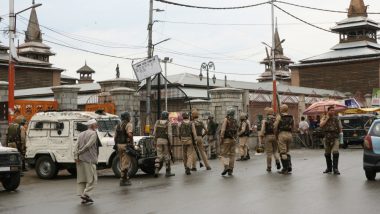Srinagar, Aug 11: The trade community in Srinagar has suffered an estimated loss of Rs 1,000 crore in the past week due to the restrictions imposed after the Centre abrogated provisions of Article 370 and divided Jammu and Kashmir into two union territories, stakeholders claimed Sunday.
"The average loss of business per day in Kashmir today is to the tune of at least Rs 175 crore as life has come to a standstill due to the restrictions imposed by the authorities," a member of the Kashmir Chamber of Commerce and Industry (KCCI) said. Article 370 Revoked: Police, Law and Order of Jammu & Kashmir Now Under Centre's Jurisdiction, Land Under Elected Govt.
The trade body leader requested anonymity as "I do not want any trouble from the authorities".
"Bakeries and livestock dealers have been the worst-hit by the restrictions as people are not able to come out of their homes to make purchases. The bakery owners stand to suffer losses to the tune of Rs 200 crore as their products have a lesser shelf life," he said.
A bakery owner in Karan Nagar area of the city said he alone stands to lose around Rs one crore.
"I have an inventory of Rs 50 lakh and overhead costs of Rs 20 lakh. Since there are no sales to show for, the interest on bank loans will break the back of my business," he said.
While some bakeries in the civil lines area of the city were running, the outlets in downtown city were not allowed to be opened by the authorities. Bashir Ahmed, a livestock dealer, hailing from Poonch, had come to Kashmir with his herd of goats and sheep in the hope of making some profit through sale of sacrificial animals on the eve of Eid-ul-Azha, but he said he might have to take most of them back with him.
"Last year around this time, I had sold off all my herd and was headed home to celebrate Eid with my family. This year I have sold only 15 of the 200-odd goats I had brought along," Ahmad said. With curbs on the movement of people, the livestock dealer is finding it very difficult to find food for his herd.
"As the restrictions were eased on Saturday, we were hopeful that sales might pick up on Sunday and Monday. However, the reimposition of restrictions in the city have dashed those hopes," he said, adding that he would make his way towards Poonch on Monday morning with whatever livestock is left with him.
Mohammed Yasin, a readymade garments dealer in Lal Chowk, has walked three days in a row from his Hazratbal home to his shop in hopes of selling some of the stocks he had purchased for Eid.
"With the situation so uncertain, people are not preparing to celebrate Eid as they would in the past years. Buying new clothes, a tradition among Kashmiri Muslims on Eid, is not on their mind this time," Yasin said.
The roadside vendors, who sell second-hand merchandise from TRC crossing to Polo View, have also been severely affected as they have not been allowed to set up their stalls on the Eid eve.
"Sunday market, as this place is popularly known, has been the poor man's favourite shopping place to buy branded clothing. Not all goods sold here are second-hand.. some of the goods are those rejected by big brands which are then off-loaded at throwaway prices.
"We have customers coming here from every nook and corner of the valley --most of them from rural areas of Kashmir -- on occasions like Eid but there will be no Eid for us this time and probably no Eid for our patrons as well," said Sajjad Hussain, a roadside vendor who had come early on Sunday morning to check the possibility of displaying his goods.













 Quickly
Quickly



















